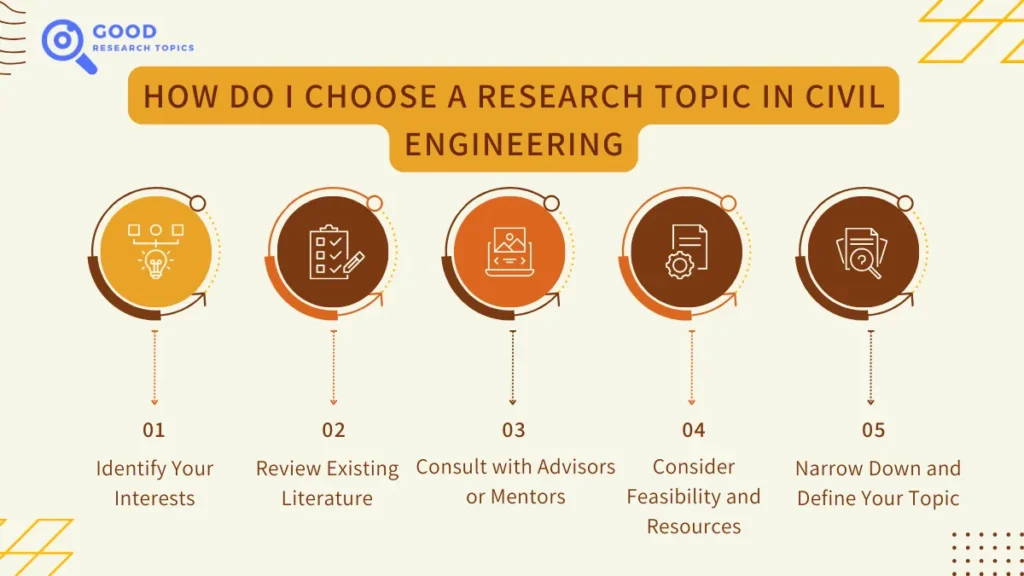Civil Engineering Research Topics For Undergraduates: Ever wondered how bridges stay strong or how buildings resist earthquakes? Civil engineering explores these marvels! Hey there, curious minds! Are you ready to dive into a world where buildings, roads, and water systems are more than meets the eye? Let’s explore intriguing civil engineering research topics designed for students like you!
Civil engineering is about creating strong, safe, and sustainable structures that shape our cities and communities. But did you know that there are many areas where civil engineers are constantly innovating? From finding eco-friendly materials for construction to making cities smarter, there’s so much to explore.
In this exciting research, you’ll get to discover how recycled materials can build sturdy structures, how technology makes our roads smarter, and how we can protect our buildings from natural disasters. Together, we’ll peek into the secrets of clean water systems, study the strength of different building materials, and understand how to make construction projects more efficient.
You May Also Like: 150 Examples of Qualitative Research Topics in Daily Life: Work-Life Balancing Act
What Is Civil Engineering Research Topics
“Civil Engineering Research Topics” refers to specific subjects or areas within the field of civil engineering that are explored, investigated, and studied in-depth by researchers, students, and professionals. These topics encompass a wide array of areas where new knowledge is sought, innovative solutions are developed, and advancements are made to address challenges in civil engineering.
Research topics in civil engineering involve examining various aspects of infrastructure, construction, and environmental systems. These topics aim to enhance understanding, improve existing practices, and innovate new methods or technologies related to designing, constructing, and maintaining infrastructure such as buildings, bridges, roads, dams, water supply systems, and more.
How Do I Choose A Project Topic in Civil Engineering?
Here are 7 steps to help you choose a project topic in civil engineering:

1. Identify Your Interests and Passion
Begin by exploring areas of civil engineering that genuinely interest you. Consider your passion for structural engineering, transportation systems, environmental sustainability, geotechnical engineering, or any other specific field within civil engineering.
2. Assess Current Trends and Challenges
Stay updated with the latest trends, challenges, and advancements in civil engineering. Look into ongoing research, technological innovations, and critical issues faced by the industry to identify potential areas for investigation.
3. Consult with Professors and Professionals
Seek guidance from your professors, mentors, or professionals in the field. Discuss your interests and potential project ideas with them. Their expertise and insights can help you narrow down your options and identify feasible research topics.
4. Review Literature and Existing Research
Conduct a thorough literature review to understand what research has already been done in your area of interest. Identify gaps or areas that require further exploration, building upon existing knowledge, or addressing unanswered questions.
5. Consider Feasibility and Resources
Evaluate the feasibility of your project topics based on available resources, time constraints, and access to necessary equipment or data. Ensure that your chosen topic is realistic within the scope of your academic program.
6. Define Objectives and Scope
Clearly define the objectives and scope of your project. Formulate specific research questions or hypotheses that you aim to address. Ensure that your topic is well-defined and achievable within the given timeframe.
7. Brainstorm and Finalize
After considering all aspects, brainstorm different project ideas and narrow them down based on your interests, available resources, feasibility, and alignment with your academic and career goals. Finally, select a project topic that aligns best with your interests, resources, and academic requirements.
List of Latest And Best Civil Engineering Research Topics For Undergraduates
Here are the following best Civil Engineering Research Topics For Undergraduates Students.
Structural Civil Engineering Research Topics For Undergraduates
- Earthquake-resistant building designs: Advances and innovations.
- Analysis of structural integrity in tall buildings: Wind-induced vibrations.
- Sustainable materials in structural engineering: Evaluating bamboo as a construction material.
- Retrofitting techniques for enhancing the seismic resistance of existing structures.
- Dynamic behavior of bridges under varying loads: Case studies and analysis.
Geotechnical Engineering
- Landslide mitigation strategies in hilly terrains.
- Soil stabilization techniques for improving foundation strength.
- Ground improvement methods in soft soil regions.
- Geotechnical investigation and analysis for tunnel construction projects.
- Impact of soil erosion on infrastructure stability: Prevention and control measures.
Transportation Civil Engineering Research Topics For Undergraduates
- Traffic flow optimization using intelligent transportation systems.
- Sustainable urban transportation planning: Promoting walking and cycling.
- Environmental impacts of transportation infrastructure: Mitigation strategies.
- Innovative designs for mass transit systems in urban areas.
- Integration of autonomous vehicles in transportation networks.
Environmental Engineering
- Water quality assessment and pollution control in urban rivers.
- Sustainable wastewater treatment technologies for small communities.
- Impact of climate change on water resources and infrastructure.
- Analysis of air quality in industrial areas: Health and environmental implications.
- Remediation techniques for contaminated sites: Case studies and innovations.
Construction Engineering and Management
- Lean construction practices: Reducing waste and improving efficiency.
- Building Information Modeling (BIM) applications in construction projects.
- Risk management strategies in civil engineering projects.
- Project scheduling and cost estimation in construction management.
- Innovations in sustainable construction practices: Case studies and best practices.
Water Resources Civil Engineering Research Topics For Undergraduates
- Hydrological modeling for flood prediction and risk assessment.
- Urban stormwater management: Green infrastructure solutions.
- River restoration techniques for ecosystem rehabilitation.
- Water supply and sanitation in rural communities: Challenges and solutions.
- Water conservation strategies in arid regions: Sustainable approaches.
Materials Engineering
- Development of self-healing concrete for infrastructure durability.
- Nanotechnology applications in construction materials.
- Recycled materials in road construction: Performance and sustainability.
- Durability assessment of asphalt pavements under heavy traffic.
- Advanced composite materials in civil engineering: Strength and applications.
Coastal and Ocean Civil Engineering Research Topics For Undergraduates
- Coastal erosion control measures and shoreline protection.
- Renewable energy extraction from ocean waves and currents.
- Offshore wind energy farms: Design challenges and innovations.
- Marine pollution monitoring and management strategies.
- Climate change adaptation for coastal infrastructure: Resilience strategies.
Urban Engineering
- Smart city initiatives: Technology integration for urban development.
- Urban heat island effect mitigation strategies in metropolitan areas.
- Sustainable urban planning: Green spaces and ecological balance.
- Accessibility and inclusivity in urban infrastructure design.
- Retrofitting strategies for improving energy efficiency in existing buildings.
Earthquake Civil Engineering Research Topics For Undergraduates
- Seismic vulnerability assessment of historical monuments and buildings.
- Performance-based seismic design of structures: Case studies.
- Earthquake early warning systems: Efficiency and reliability.
- Retrofitting techniques for bridges and infrastructure in seismic zones.
- Response spectrum analysis in earthquake engineering: Applications and challenges.
Railway Civil Engineering Research Topics For Undergraduates
- High-speed rail technology: Infrastructure design and operational challenges.
- Rail track maintenance and performance enhancement techniques.
- Energy efficiency in rail transportation systems.
- Integration of magnetic levitation technology in railway networks.
- Railway signaling systems and safety measures: Improvements and innovations.
Geographic Information Systems (GIS) in Civil Engineering
- GIS applications for urban planning and infrastructure development.
- Spatial analysis for disaster management and emergency response.
- 3D modeling and visualization in civil engineering projects.
- Land use planning and decision-making using GIS techniques.
- Remote sensing applications in civil engineering: Monitoring and analysis.
Tall Building Design and Construction
- Wind engineering and wind-induced vibrations in tall buildings.
- Sustainable design strategies for skyscrapers.
- Structural fire safety measures in high-rise buildings.
- Performance-based design approaches for supertall structures.
- Façade engineering and innovations in building exteriors.
Hydraulic Civil Engineering Research Topics For Undergraduates
- Hydroelectric power generation: Advances in turbine technology.
- Water distribution network optimization and hydraulic modeling.
- Floodplain management and sustainable flood control measures.
- Hydraulic modeling for irrigation and agricultural water management.
- Urban drainage systems and stormwater management: Efficiency and sustainability.
Structural Dynamics and Earthquake Resistant Structures
- Base isolation and seismic retrofitting techniques.
- Performance-based design for earthquake-resistant structures.
- Vibration control methods for tall buildings.
- Nonlinear dynamic analysis of structures under seismic loads.
- Seismic isolation systems and their effectiveness in building protection.
Smart Materials in Civil Civil Engineering Research Topics For Undergraduates
- Shape memory alloys in structural engineering applications.
- Self-healing materials for infrastructure sustainability.
- Piezoelectric materials for structural health monitoring.
- Phase change materials in building envelope applications.
- Smart sensors and actuators in civil infrastructure: Applications and advancements.
Renewable Energy and Sustainable Infrastructure
- Solar energy integration in buildings and infrastructure.
- Green roofs and sustainable urban infrastructure.
- Energy harvesting technologies in civil engineering.
- Biomass-based energy generation from agricultural waste.
- Life cycle assessment of renewable energy infrastructure: Environmental impacts.
Construction Automation and Robotics
- Autonomous construction equipment and robotics applications.
- 3D printing in construction: Advancements and applications.
- AI and machine learning in construction project management.
- Robotics in bridge inspection and maintenance.
- Automation in prefabrication and modular construction techniques.
Pavement Civil Engineering Research Topics For Undergraduates
- Sustainable pavement materials and design.
- Asphalt recycling and pavement sustainability.
- Pavement management systems for long-term maintenance.
- Performance-based specifications in pavement engineering.
- Analysis of factors affecting pavement roughness and ride quality.
Resilient and Adaptive Infrastructure
- Resilience engineering for climate-resilient infrastructure.
- Adapting infrastructure to rising sea levels and coastal hazards.
- Disaster-resilient communities: Infrastructure design and planning.
- Smart grid technologies for resilient energy infrastructure.
- Infrastructure asset management for long-term resilience.
Non-Destructive Testing and Evaluation
- Ultrasonic testing techniques for concrete structures.
- Ground-penetrating radar applications in civil engineering.
- Infrared thermography in detecting structural defects.
- Acoustic emission testing for monitoring structural integrity.
- Advanced imaging technologies for infrastructure inspection.
Sustainable Development and Green Construction
- Green building certifications: Evaluating their impact on sustainability.
- Circular economy principles in construction and demolition waste management.
- Urban agriculture and green infrastructure integration.
- Eco-friendly construction practices in low-income housing.
- Life cycle analysis of sustainable building materials.
Remote Sensing Applications in Civil Engineering
- Satellite imagery analysis for land use planning and development.
- UAV (drone) technology applications in civil engineering.
- LiDAR technology for terrain mapping and topographic surveying.
- Remote sensing-based monitoring of infrastructure projects.
- Integration of geospatial data for infrastructure development.
Disaster Management and Resilient Infrastructure
- Disaster risk reduction strategies in civil infrastructure.
- Infrastructure resilience to extreme weather events.
- Early warning systems for natural disasters: Effectiveness and challenges.
- Post-disaster recovery and reconstruction planning.
- Community-based disaster management approaches.
Sustainable Transportation Systems
- Low-carbon transportation strategies for urban areas.
- Bicycle infrastructure planning and promotion in cities.
- Electric vehicle infrastructure development and challenges.
- Public transit accessibility and equitable mobility solutions.
- Pedestrian-friendly urban design: Improving walkability.
Urban Resilience and Smart Cities
- Climate-responsive urban planning: Adaptive strategies for cities.
- Resilient housing solutions for informal settlements.
- Big data analytics in urban infrastructure management.
- IoT (Internet of Things) applications for smart city infrastructure.
- Governance and policy frameworks for sustainable urban development.
Water-Energy Nexus in Urban Areas
- Integrated approaches for water and energy conservation in buildings.
- Water-energy-food nexus: Synergies and trade-offs in urban settings.
- Renewable energy integration in water supply and treatment systems.
- Smart irrigation systems for urban agriculture.
- Greywater reuse systems in residential and commercial buildings.
Health and Safety in Construction
- Occupational health hazards in construction: Prevention and management.
- Safety culture development in construction organizations.
- Ergonomics and musculoskeletal disorders in construction work.
- Mental health issues in the construction industry.
- Safety technology innovations for construction site monitoring.
Green Infrastructure and Nature-Based Solutions
- Urban green spaces and biodiversity conservation.
- Rainwater harvesting systems for sustainable water management.
- Green roofs and vertical gardens in urban environments.
- Permeable pavements and their role in stormwater management.
- Urban forests and their impact on climate resilience.
Risk Assessment and Management in Civil Engineering
- Probabilistic risk assessment in infrastructure design.
- Resilience-based decision-making in civil engineering projects.
- Disaster recovery planning and risk mitigation strategies.
- Uncertainty analysis in infrastructure planning and management.
List Of Research Topics In Civil Engineering Pdf
Here are the Best Civil Engineering Research Topics For Undergraduates.
Latest Research Topics in Civil Engineering:
- AI-Enabled Structural Health Monitoring: Using Artificial Intelligence for Predictive Maintenance in Civil Structures.
- Circular Economy Integration in Construction: Implementing Sustainable Practices and Materials in Building Projects.
- Resilient Infrastructure to Combat Climate Change: Designing Climate-Adaptive Structures for Extreme Weather Events.
- BIM and IoT Integration in Smart Construction: Advancements in Building Information Modeling and Internet of Things for Construction Efficiency.
- Green Urban Spaces for Sustainable Cities: Integrating Nature-Based Solutions in Urban Planning for Environmental Benefits.
Simple Research Topics for Civil Engineering Final Year Students
- Study of Sustainable Construction Materials: Analyzing the Environmental Impact of Recycled Materials in Building.
- Traffic Flow Analysis in Urban Environments: Assessing Traffic Patterns and Congestion Solutions in Cities.
- Geotechnical Investigation of Soil Properties: Soil Testing and Analysis for Foundation Design.
- Structural Performance of Building Materials: Comparative Study of Concrete and Steel in Construction.
- Water Quality Analysis of Local Water Bodies: Assessing Pollution Levels and Remediation Strategies.
Research Proposal for Civil Engineering Students
Title: “Implementing Sustainable Practices in Urban Construction for Environmental Conservation”
Introduction: Urbanization and construction activities significantly impact the environment. This research aims to explore sustainable practices in urban construction to minimize environmental degradation.
Objectives:
- Evaluate the Use of Recycled Materials: Analyze the feasibility and effectiveness of integrating recycled materials in building construction.
- Green Infrastructure Assessment: Study the benefits and challenges of incorporating green spaces in urban areas for environmental conservation.
- Energy-Efficient Building Design: Investigate design strategies for reducing energy consumption in urban structures.
- Environmental Impact Analysis: Assess the overall environmental impact of sustainable construction practices on local ecosystems.
- Community Engagement and Awareness: Explore methods to educate and involve communities in promoting sustainable construction practices.
Methodology:
- Literature Review: Analyze existing research on sustainable construction practices.
- Field Studies: Conduct surveys and case studies in urban areas to assess the implementation of sustainable practices.
- Data Collection: Gather data on material usage, energy consumption, and environmental impact.
- Analysis and Recommendations: Evaluate findings and propose recommendations for integrating sustainable practices in urban construction.
Conclusion: The research aims to provide insights into the practical implementation of sustainable practices in urban construction, contributing to environmentally conscious urban development.
This proposed research project aligns with the goal of fostering sustainable urban development by investigating practical approaches to mitigate environmental impact in construction projects.
What Can Be A Good Topic For Research Being A Civil Engineering Student?
As a civil engineering student, selecting a compelling and feasible research topic is crucial. Here are several potential research topics that could be interesting and impactful:
- Smart Cities and Infrastructure: Investigate the integration of technology and sustainable practices in urban planning to create more efficient, resilient, and eco-friendly cities.
- Earthquake-Resistant Building Techniques: Explore innovative methods and materials for designing structures to withstand seismic events more effectively.
- Sustainable Construction Materials: Research the development and application of eco-friendly and durable construction materials, such as recycled aggregates or bio-based materials.
- Traffic Management and Urban Mobility Solutions: Analyze traffic flow patterns, congestion, and propose solutions for efficient transportation systems within cities.
- Water Resources Management: Focus on water conservation strategies, efficient distribution systems, or water quality improvement methods.
- Renewable Energy Integration in Infrastructure: Study the incorporation of renewable energy sources, like solar or wind power, into civil engineering projects for sustainable energy solutions.
- Resilient Infrastructure against Climate Change: Investigate adaptation measures and designs to mitigate the impact of climate change on infrastructure.
- BIM (Building Information Modeling) in Construction: Explore the applications and benefits of BIM technology in improving project planning, collaboration, and efficiency.
- Geotechnical Engineering Studies: Investigate soil stabilization techniques, slope stability analysis, or ground improvement methods for construction projects.
- Waste Management in Construction: Research strategies for reducing construction waste, recycling materials, and implementing sustainable waste management practices.
Wrap Up
Civil Engineering Research Topics For Undergraduates span a wide spectrum, offering budding engineers a canvas of innovation and discovery. These topics stand as gateways to unraveling the complexities of infrastructure, environment, and urban development. They encompass critical aspects like structural integrity, sustainable practices, technological integration, and societal resilience.
As budding civil engineers, delving into these research avenues presents an opportunity to amalgamate theoretical learning with practical application. Exploring seismic-resistant designs, sustainable materials, smart infrastructure, or traffic management systems not only nurtures academic growth but also contributes to addressing real-world challenges.
Through meticulous investigation and analysis, undergraduates can influence the trajectory of civil engineering. These topics not only serve as catalysts for academic growth but also sow the seeds of transformative change. Whether it’s devising innovative materials, embracing technology for smarter cities, or fortifying structures against natural calamities, each exploration advances the collective goal of creating a more sustainable, resilient, and efficiently built environment.
FAQs
What factors should I consider when selecting a research topic in civil engineering?
When choosing a research topic in civil engineering, consider your interests, the current trends in the field, the feasibility of conducting the research within available resources, and the potential impact of the research.
How can I narrow down a broad research area into a specific topic for my undergraduate research project in civil engineering?
To narrow down a broad research area, conduct extensive literature reviews to identify gaps or specific problems within the field.



